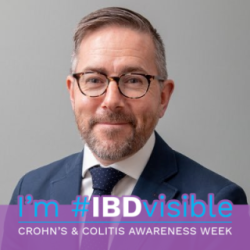When Drs. Truelove and Witts first described their criteria for ‘mild’, ‘moderately severe’ and ‘severe’ ulcerative colitis in 1955, little did they know that we’d still be using them to categorize patients in 2022. For the last 70 years, physicians treating patients with IBD have used a similar mix of symptoms, signs and inflammation markers to aid in treatment decisions. Such methods of assessing disease severity have proven their longevity in both practice and clinical trials, and are the basis for all our FDA-approved therapies.
At this year’s AIBD meeting, I will be speaking on this topic (Assessing Disease Severity in IBD), and providing my perspective on expanding our measures beyond just intestinal symptoms and signs. The main take-home message for clinicians will be to appreciate the impact of IBD on a patient’s quality of life, and prognosis, over a lifetime. Although we often focus on ‘acute severity’, via symptoms, it is important to recognize long term sequelae in ‘chronic severity’. The International Organization for the Study of Inflammatory Bowel Disease (IOIBD), has published several factors that should be used to evaluate chronic disease impact. These include quality of life and disability measures, fecal incontinence, risks of intestinal surgery and colon cancer. Including these in periodic assessments should provide a more holistic overview of a patient’s disease burden. Regulators are also now requiring more patient-focused and chronic disease outcomes to be included in the efficacy and safety evaluation of novel therapies.
The second part of my talk will highlight the discrepancies between patient and physician assessments of disease severity. A number of studies have identified a frequent disconnect in how patients perceive the severity of their disease, and how their clinicians rate it. Physicians often focus on a narrow range of symptoms, using widely-used disease activity scores. However, recent studies have highlighted how IBD, even in clinical remission, can adversely affect defecation, sleep patterns, energy levels, and work productivity. The wide availability of wearable technology to track sleep, exercise and mood, has provided insights to disease burden that have been under-appreciated in the past. I hope to highlight these factors so that clinicians will consider the impact of IBD on an individual patient’s life beyond just stool frequency and abdominal pain. The widely-quoted aphorism “you can’t understand someone until you’ve walked a mile in their shoes” would seem appropriate advice when assessing the burden of IBD in practice.
In the same AIBD session, other speakers will review key topics such as Therapeutic Drug Monitoring, Treat-to-Target, Management Algorithms, and the Keynote from Stephen Hanauer MD.
Dr. Moss has no conflicts of interest to report.
Image by Olga Zakharova / GettyImages






